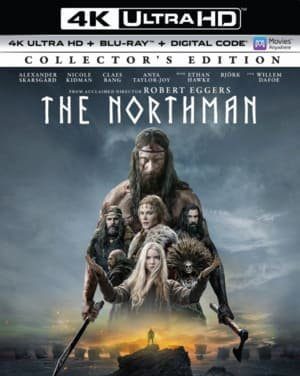Late ninth century, a small island in the North Atlantic. King Orvandil, seriously wounded, returns from a campaign to his wife Gudrun and young son Amlet. Dreaming of going off to another battle and dying on the battlefield, he hands the throne to his son, but is immediately killed by his brother Fjolnir, who beheads the monarch and takes the kingdom and Gudrun for himself. The boy manages to escape.
Decades later, Amlet grows into a tough, ruthless Viking, and one day in another devastated village he meets a witch who instructs him to pursue vengeance. After learning that Fjolnir and Gudrun have settled in Iceland, Amlet travels there with a shipment of Slavic slaves. On board his attention is drawn to Olga of Birchwood.
4k movies reviews
When Eggers directed The Witch, his vision of the horror genre was instantly recognized by critics as “sublime. The director looked at the sinister through the prism of folklore. By surrendering to the atmosphere of the era, he took sound and visual possibilities to a new level. In “Viking,” however, Eggers takes on a more imposing canvas. The film is set in tenth-century Iceland. There is no unified culture here, just rival kingdoms, gangs, faiths and interests. And all this with the director’s inherent strangeness and savagery that permeates the ancient mythology.
Perhaps the greatest achievement for a historical drama is to truly immerse the viewer in a time and place. Not just to recreate events and scenery, but to infuse every moment with culture, worldview, and a sense of that setting. By these standards, Robert Eggers’ Viking is definitely a success, but it’s also a bloody, brutal tale of revenge that you want to empathize with.
This is the story of Amlet (Alexander Skarsgard), an unruly, pissed-off Viking prince who seeks revenge for his lost kingdom in Scandinavia. If the story sounds familiar, it’s because the story of Amlet is a Viking epic of obscure origin, later versions of which formed the basis for Shakespeare’s Hamlet. It is not, however, a typical hero’s journey with intrigues around the throne. Amlet belongs to a different, more austere era, when a king can have no higher honor than to die by the blade. Amlet’s father, King Aurvandillus (Ethan Hawke), recently returned from war, wounded he prepares his young son for possible bloodshed. He does this through a strange ritual in a smoky otherworldly cave, where they call out to their ancestors and howl on all fours, aided by Heimir the Fool (again, a deranged Willem Dafoe). In the world of “Northman,” we are all just rabid animals occupying flabby sacks of human skin. The only obligations: to avenge his father and protect his mother and the kingdom. This vow, however, is ignored by his uncle, the black-bearded Fjellnir (Klas Bang), who, of course, brings tragedy into young Amlet’s life, killing his father and forcing him to travel to distant shores, where he becomes a fierce, muscular warrior.
Much of the film relies on a polished visual flair, employing more camera movement than the director is accustomed to. A brutal episode involving Amlet and a gang of skinned Vikings shows them attacking the village like a pack of animals. The elaborate tracking shot that accompanies the scene feeds the camera’s insane appetite for the blood-soaked bodies and the chilling screams of the warriors. One shot, reminiscent of Elem Klimov’s “go and see” film, finds a burning house filled with weeping villagers as a backdrop for Amlet’s unwavering stare into the camera. Unlike Klimov’s film, this is not the image of a boy horrified by war. This is a ruthless man fueled by conflict and bloodshed. The demonstrated cruelty shown to the weaker villagers is another way in which Eggers shows that he does not make concessions for the sake of more mainstream entertainment.
The Viking myths seem to be embedded in the film’s DNA: the prophecies, the genealogical trees, and the magic sword are as real as the lush landscapes, and Valhalla seems like a neighboring country. This is aided by a fine cast, surreal ritualistic music, and, of course, by Eggers’ vision. For an outwardly simple tale of revenge, “The Northerner” does not shy away from ambiguity. It lives and breathes like the old epics. Not cartoonish depictions of warriors in horned helmets, but ancient myths to which Eggers shows deep respect.
Info Blu-ray
Video
Codec: HEVC / H.265 (62.1 Mb/s)
Resolution: Native 4K (2160p)
HDR: Dolby Vision, HDR10
Original aspect ratio: 2.00:1
Audio
English: Dolby TrueHD with Dolby Atmos 7.1 (48kHz, 24-bit)
English: DTS-HD Master Audio 7.1 (48kHz, 24-bit)
English: Dolby Digital 5.1
English: Dolby Digital 2.0
Spanish: Dolby Digital Plus 7.1
French: Dolby Digital 5.1
Subtitles
English SDH, Spanish, French.

